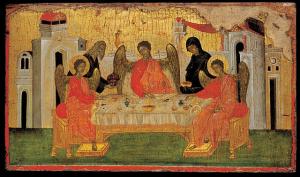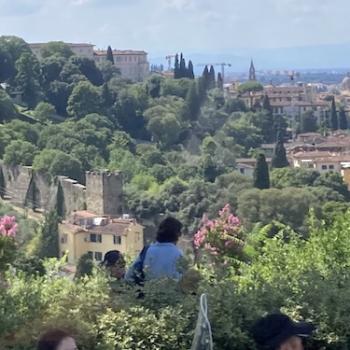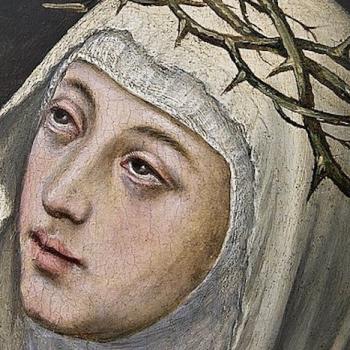
This morning our gospel points us to what I’m going to call apocalyptic hospitality. My message is this: you are a unique invitation into the divine life that God has sent out into the world.
Slowing Down to See
In Luke 10, Jesus is sending out 70 Apostles like harvesters into the fields, but also like sheep among wolves. To get a sense of what he’s up to here, let’s back up a few verses into ch 9.
The mood of Luke’s gospel intensifies in ch 9, and the action slows down. It’s like in Harry Potter 3, which Lola and I have just finished reading together. The last 24 hours take nearly a third of the book. “Was that really yesterday, that part we read several weeks ago?” Here we read that the end is near and Jesus turns toward Jerusalem, even though there are 15 chapters left. He is pressed with a new urgency. Everything he says and does is loaded with significance, as if it could be the last thing his disciples hear and see from him.
Remember the argument between the disciples over who was the greatest? That happens here. It’s a funny little story, really. The 12 coming off like preteens. Jesus responds in fact by turning the tables on their immaturity. He places a child in front of them and says
Whoever welcomes this child in my name welcomes me, and whoever welcomes me welcomes the one who sent me; for the least among all of you is the greatest.
Jesus is, I think, performing a little apocalypse here.
Apocalypse and the Child
The word apocalypse conjures up images of fire and destruction—we partly have Brando to thank for that. The word actually means unveiling, a pulling back of a curtain so that we can see reality in an unfiltered way. Here Jesus performs an unveiling over this child. There is deep invitation to share in the eternal love of God in this moment, he says. But it’s in the vulnerable child standing in front of you—in the chance to welcome this child. It’s got nothing to do with whoever wins your argument. You’ll miss the invitation if you miss the child.
In fact, this is the way Luke presents the triune God to us. The Holy Spirit, for Luke, is the presence of God that connects us with Jesus, and that Spirit goes with us—is upon us— as we go out into the world. So here: The child bears the Spirit, and to welcome the Spirit is to welcome Jesus, and to welcome Jesus is to welcome the one he calls Father. It’s like a transitive property of Trinitarian doctrine. If the child…then the Father.
Jesus gives the disciples a chance to see differently: they thought there was a child standing there in their way, and they ignored her so they could talk about greatness. Then Jesus pulled back the veil. Your way into the life of God is here, he said.
Apocalyptic Hospitality
And now the 70. This is the only reference to this larger group of Apostles in any of the four gospels. Their presence seems to me to be part of the urgency. Jesus has turned his face toward Jerusalem, his end is upon him, and there’s so much left to be done. So he gathers more workers, and he sends them out.
But notice his instruction to them. Go out without purse, bag or sandals. Carrying no sandals, so I suppose they can wear some.
Remain in the same house, eating and drinking whatever they provide,
Whenever you enter a town and its people welcome you, eat what is set before you; cure the sick who are there, and say to them, `The kingdom of God has come near to you.’
Go and make yourselves vulnerable to the welcome of others. If they don’t feed and house you, you’ll be hungry and homeless.
He’s really asking them if they’ve learned the lesson of the child. Are you ready to become vulnerable to the welcome of others? Like that child was?
To be an apostle is to carry the Spirit of Christ out into the world, inviting the world’s hospitality.
A Trinitarian Invitation
Then we get the Trinitarian unveiling once again, the apocalypse:
“Whoever listens to you listens to me, and whoever rejects you rejects me, and whoever rejects me rejects the one who sent me.”
That’s what’s really going on, whenever we take the risk of showing up for one another and giving them an authentic and unmanipulated chance to welcome or reject us. The Spirit is opening up in the world a new way into the Triune life of God.
You are a unique invitation into the divine life that God sends out into world.
I think this texts is calling us to something. But I don’t think we’ll hear it if we immediately turn it into a to-do list. For instance: 1. Be more welcoming. 2. Give others a chance to be welcoming of me.
I think, instead, the apocalypse is the point. The most vulnerable creature in front of you is the presence of the Spirit, inviting you into the life of Jesus and the one he calls Father. If you are called by that God, you are called to be that presence of the Spirit for others.
When Satan Falls
And that invitation to hospitality is so powerful, Jesus, says, that he can see Satan fall like lightning when we welcome one another. It’s the strangest part of the whole passage. They 70 return to tell Jesus that their small experiment in hospitality worked. And he says in that moment he saw Satan fall.
God invites the world into the cosmic overcoming of evil in this surprising way: through small acts of hospitality. And God has never before offered that invitation quite in the way he offers it in you.
You are a unique invitation to others, to see Satan fall like lightning in your small acts of love and authentic presence. Just who you are. And God has sent you out into this world on purpose.
The Call to Divine Hospitality
Before it tasks us with doing anything, Luke 9-10 invites us to slow down and see more deeply. To see the children and vulnerable ones around us as invitations into God’s great love. And then to see ourselves as that Spirit-filled invitation to others.
This is my prayer for you this weekend. That you will allow God to show you what’s going on behind the veil. That you’ll see the Holy Spirit in those around you, and then even come to see yourself as the embodiment of that Spirit, inviting those near you into God’s gracious and hospitable life. That’s who you are. There’s nothing better you could be.
[A sermon for the people of St. Julian of Norwich Episcopal Church, July 3, 2022]










